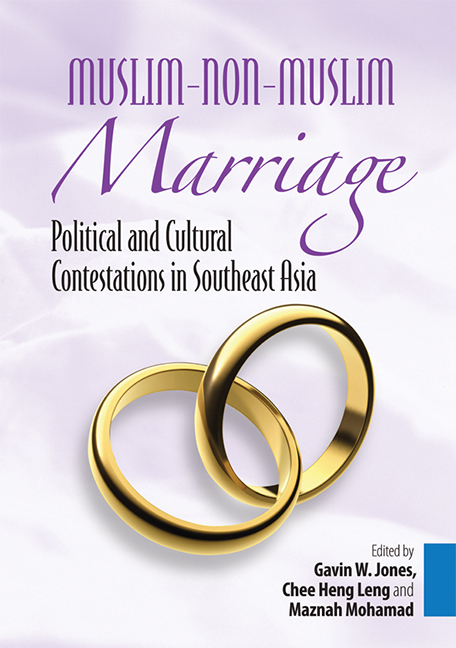Chapter 1 - Muslim-non-Muslim Marriage,Rights and the State in Southeast Asia
from Introduction
Published online by Cambridge University Press: 21 October 2015
Summary
INTRODUCTION
Marriage has never just been between two people. The academic literature on how and why this is so is voluminous. In various societies, at various times, marriages have been made to cement bonds between families, as part of business relationships, and in the case of the ruling classes, to establish diplomatic ties between countries. Levi-Strauss's classic work on marriage as constituting an exchange of women as bearers of social value in society has, of course, been variously examined, built upon, and challenged. Recent studies on international marriages in Asia, for example, are challenging the perspective that women are passive objects of exchange, positing instead that women's agency often plays a strong and decisive role in the contracting of such marriages (Constable 2005).
It is often the case, therefore, that marriage becomes a site of contestation — between and among individuals, families, communities, and states. In this part of the world, the example that comes easily to mind is the case of Maria Hertogh, a Dutch girl whose Catholic parents left her with a Muslim woman, Aminah Mohammed, in the chaotic circumstances of the Japanese invasion of Java in 1942. When the war ended, the Dutch parents who had returned to Holland after losing trace of Maria, searched for and found her in the Malay peninsula in late 1949, being brought up as a Muslim by Aminah. The events that ensued in Singapore witnessed the progression of a legal wrangle over adoption to full-scale riots in December 1950.
The issues were complicated, notably, by the fact that Maria, at the age of thirteen, had married Mansoor Adabi, a Muslim from the state of Kelantan, under Muslim law on 1 August 1950, three days after the first set of legal actions failed to return Maria to her parents. Nevertheless, the second set of legal actions instituted by her parents, challenging the validity of the marriage while claiming custody and parental rights, was successful. The merits of the legal judgement notwithstanding, the local Malay population widely perceived it to be a dismissal of Islamic marriage law, and the issues, as cast by the Malay nationalist movement, became inextricably entangled with those of religious confrontation, Malay nationalism, and anti-colonialism (Hussin 2005).
- Type
- Chapter
- Information
- Muslim-Non-Muslim MarriagePolitical and Cultural Contestations in Southeast Asia, pp. 1 - 30Publisher: ISEAS–Yusof Ishak InstitutePrint publication year: 2009



